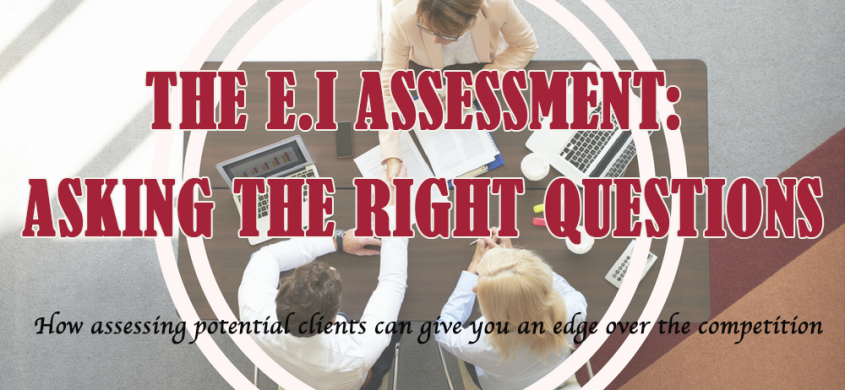The E.I Assessment: Asking the Right Questions
The psychology of client relations is a strange thing.
Far too many business owners and salespeople change their core philosophy that has brought them success exactly at the moment that they receive an opportunity to score their biggest client, contract, customer, or sale.
Why? A simple (and completely natural) reaction: Nervousness.
When pursuing a new, super sized client will require some adaptation. The key to managing this situation successfully, however, is to change your process, not your philosophy.
The distinction between these two approaches isn’t always easy to see, but it does make a big difference. One of the best ways to ‘adapt without changing’ is to analyze specifically your client’s pains and desires in order to respond to those just as you would with any other client. Problems are always easier to solve when they are clearly defined, and, regardless of what industry you’re in, your job is to “solve X problem for Y person or business.”
The E.I assessment is one of the most effective ways to find out exactly what your potential clients are looking for. It helps both them and you determine the Emotional (E) and Intellectual (I) reasons why that client is interested in working with you. The E.I assessment you write for your clients will vary based upon your industry and your target market, but the following examples may help get you started.
Examples of Emotional questions include:
- Why are you interested in doing this?
- What are some of the problems you’re attempting to avoid or solve? What are your aspirations in this?
- What would be the ideal outcome or the goal in this project or in this endeavor, in this engagement?
Examples of Intellectual questions include:
- What are your product requirements?
- What are some of the technical specs that you require?
- How many people do you have to train or to coach?
- What are your financial goals and limitations?
The takeaway: writing a brief assessment survey for your potential clients can help get you both on the same page, allowing you to meet their needs more effectively and efficiently according to your own established policies and practices.



